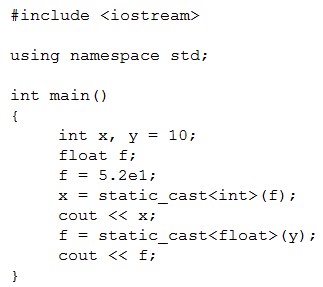C++ Institute CPA-21-02 - CPA - C++ Certified Associate Programmer
What happens when you attempt to compile and run the following code?
#include
using namespace std;
int main(){
int i, j;
for(i = 0, j = 1; j < 2, i < 4; i++, j++);
cout << i << " " << j;
return 0;
}
What happens when you attempt to compile and run the following code?
#include
using namespace std;
int fun(int x);
int main() {
cout << fun(0);
return 0;
}
int fun(int x) {
if(x > 0)
return fun(x-1);
else
return 100;
}
What happens when you attempt to compile and run the following code?
#include
using namespace std;
void set(struct person*);
struct person
{
int age;
};
int main()
{
struct person e = {18};
set(&e);
cout<< e.age;
return 0;
}
void set(struct person *p)
{
p?>age = p?>age + 1;
}
Given:
#include
#include
using namespace std;
int main () {
try
{
int * myarray= new int[1000];
}
catch (bad_alloc&)
{
cout << "Error allocating memory";
}
catch (exception& e)
{
cout << "Standard exception";
}
catch (...)
{
cout << "Unknown exception";
}
return 0;
}
What will happen if we use the operator “new†and the memory cannot be allocated?
What happens when you attempt to compile and run the following code?
#include
#include
using namespace std;
int f(int i, int b);
int main()
{
int i=0;
i++;
for (i=0; i<=2; i++)
{
cout< } return 0; } int f(int a, int b) { return a+b; }
What is the output of the program?
#include
#include
using namespace std;
int main () {
string s1 = "Hello", s2 = "World";
s2 = s1 + s2;
cout << s2;
return 0;
}
What happens when you attempt to compile and run the following code?
#include
#include
using namespace std;
class B;
class A {
int age;
public:
A () { age=5; };
friend class B;
};
class B {
string name;
public:
B () { name="Bob"; };
void Print(A ob) {
cout << name << ob.age;
}
};
int main () {
A a;
B b;
b.Print(a);
return 0;
}
What happens when you attempt to compile and run the following code?
#include
using namespace std;
class complex{
double re;
double im;
public:
complex() : re(0),im(0) {}
complex(double x) { re=x,im=x;};
complex(double x,double y) { re=x,im=y;}
void print() { cout << re << " " << im;}
};
int main(){
complex c1(1,2);
c1.print();
return 0;
}
What happens when you attempt to compile and run the following code?
#include
#include
using namespace std;
class First
{
string *s;
public:
First() { s = new string("Text");}
~First() { delete s;}
void Print(){ cout<<*s;}
};
int main()
{
First FirstObject;
FirstObject.Print();
FirstObject.~First();
}
What happens when you attempt to compile and run the following code?




